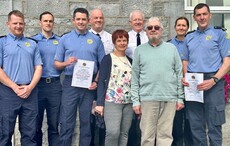Saskatchewan Province in Canada is growing as a popular destination for the Irish, thanks in part to a healthy economy and the demand for work. Despite partly sub-arctic winter temperatures, the province is attracting huge numbers of Irish.
The Irish Times reports on the Morrissey family who relocated to Saskatchewan from Tipperary in 2009. The Morriseys emigrated to Saskatchewan in 2009 after attending a Working Abroad Expo in 2009. In March of this year, a similar event attracted nearly 20,000 people.
The Morriseys attended that one as well, but instead of looking for work abroad, they were there to help teach people about Saskatchewan and share their experiences.
A spokesperson for the Saskatchewan Immigrant Nominee Program says that around 300 Irish families are currently in the process of moving to the region after receiving offers from employers at these jobs fairs.
Up to recently, the destination was next to unheard of in Ireland. However, the Morrissey’s - Sinead, Howard and their 11 year old daughter Cara - have seen an upswing in the Irish population in Saskatchewan.
Upon arriving in 2009, Howard, a carpenter, remembers not knowing of any other Irish people in the area. That however has now changed, as Howard says he hears of Irish people arriving nearly every week for either short term or long term stays in the Canadian province.
While the capital, Regina, is lacking an Irish centre that could serve as a meeting place for Irish immigrants, a new Facebook page is proof of a new era of immigration and is being deemed “invaluable” for newcomers to the area. An array of people - single, married, families, even some married men who have branched out on their own in hopes of having their families join them later - are all chatting away on the New Regina Facebook page.
John Hopkins, chief executive of Regina’s Chamber of Commerce, calls the labor market in Saskatchewan a “perfect storm.” While the economy there is expanding, the workforce is also aging, providing an opening for new jobs and high demand for workers. It is likely that the scenario will remain the same for the next 20 years.
Recruitment for the projected 75,000 to 90,000 jobs in Saskatchewan will mainly be in the areas of technology, construction, mineral exploration, agriculture and petroleum.
Hopkins said “Ireland makes a lot of sense as a human resource because cultures, law and language are largely the same. The cuisine is similar, the education too, so people will fit in easily. The skills and trades credentials appear to be on par with Canada. The major hurdle standing in the way is immigration.”
While the current cap on the number of people who can enter the Saskatchewan province under a program that recommends applicants for permanent residency sits at 4,000 people, many are calling for the total to be bumped up to 6,000. So far, the central government has denied Saskatchewan’s calls for a larger cap.
Michael Fougere, the president of the Saskatchewan Construction Association, fears that a lack of skilled workers will slow the economy down. “This is a huge issue for us. If we don’t find people to do the work, we will slow down. We need carpenters, electricians, engineers and people in every area of construction.”
“We have asked the government to lift the cap on skilled workers but they have so far refused to give us more and this is a constraint for us.”
In nearby Calgary in the neighboring province of Alberta, the economy is facing the same issues - economic growth and a demand in workforce, but limits restricting the amount of immigrant workers.
Calgary Economic Development is looking to the UK and US to fill an approximate 114,000 jobs to be created over the next 10 years. They are currently finalizing details of a trip to Ireland in October where a range of Alberta’s employers will try to entice Irish workers to the region.
While the promise of high workforce demand is undoubtedly alluring for many Irish, the transition to the provinces in Canada may prove difficult. A harsh difference in weather - plummeting temperatures in the winter and the opposite in the summer - could be tough to handle coming from temperate Ireland.
However, many Canadian groups – from the immigration authorities, to employers, to Irish workers on the ground – are pulling together to help people transition smoothly into their new lives. There is a real sense that the Irish are not only needed, but wanted.
Paul Farrell emigrated to Saskatchewan after attending an abroad job fair in Ireland. His business wasn’t helping to pay the bills as the recession tightened, and happened to learn about the promise of Canada at the fair.
“The whole immigration process was very, very good. After the fair, I got in contact with Saskatchewan immigration, and they took care of it all,” said Farrell, who noted to the change in lifestyle was an adjustment, but that he is growing to quite like it.




Comments